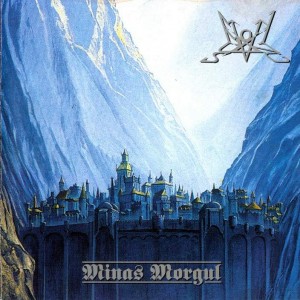
Great Death Metal, through its boundless courage, developed an uncanny ability to plunge listeners into a subterranean labyrinth, revealing the philosophical impetus that stimulated the development of the genre itself. Black metal is slightly inverted, wherein the meandering melodic and thematic developments reveal an adventurous spirit and a desire to plunge into and discover the majesty of the infinite. Indeed, although each genre is somewhat complimentary there is a stark philosophical difference that characterizes each, where Death Metal revels amongst the catacombs and forces listeners to re-evaluate life in the face of their impending doom, Black Metal having stared long enough into the abyss and having emerged from the catacombs seeks glory amongst the stars, and in so doing provides listeners with a glimpse into what once was, and must be again.
Minas Morgul is a testament to this very spirit. Individually meandering, soaring and delicate melodic phrases weave around one another, periodically converging and thus creating a breathtakingly lucid and organically familiar polyphonic structure. What the listener will find most striking is the way each melodic motif develops according to its own internal logic while simultaneously complimenting and augmenting the presentation and development of concurrent melodic lines, which themselves develop according to their own internal logic. Here the infinite abounds as listeners bear witness to the expert use of polyphony, with each rung in the ethereal melodic hierarchy subtly altering the emotional experience of the listener through its capacity for slight differentiation.
The individual melodic motifs themselves are more robust and less restrained than the cryptic sense of melody that characterized say early Darkthrone. However therein lay this albums strength, as each melody is highly communicative and capitalizes on its inherently archaic, although timeless content to appeal those psychological archetypes that define the modern Hessian, to wit, regality, a desire for adventure, wanderlust and a sense for the transcendent.
Guitars are a secondary instrument on this album, however they are utilized with such tact and melodic viciousness, if I may say so, as to ensure that the sometimes airy and sentimental melodies remain grounded, bonded to an orthodox sense of attack and ferality that has always made great metal threatening, challenging, confrontational, and insightful.
Indeed, what makes this album truly compelling is that it successfully melds together a romantic longing for those eternal values that once gave life meaning, with a feral and commanding spirit that wishes to take hold of life and explore it’s depths, and its mountainous heights! One is less likely to find an album more suitable to one’s journey of self exploration and self transcendence.
-TheWaters-
1 CommentTags: Austrian Black Metal, Black Metal, Epic Metal, minas morgul, Summoning, Transcendence


